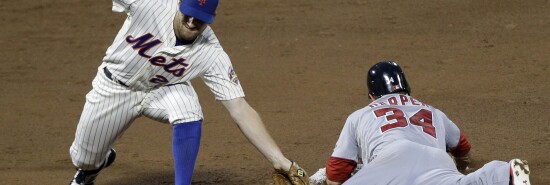
Opening Day: Change is inevitable and usually bad
Timothy P. Carney
Video Embed
The clock ticking down to zero is part of the thrill of football, basketball, and hockey, but it doesn’t belong in baseball. Baseball is a different game.
Baseball can be slow. It can be deliberate. It can be languid.
LET’S KEEP CALLING BALLS AND STRIKES
Baseball is played on summer evenings, and sometimes in the 7th inning, with a man on first and two outs, the television commentators might not say a word for 20 seconds between two foul balls because they have all night to say what they have to say — like some dudes sitting around a fire pit on a summer evening.
That’s not everybody’s idea of good sports, but it doesn’t have to be. Not everyone is going to be a baseball fan. And yet when Major League Baseball decided it needed to revamp its game in order to gain fans, the league clearly began from the same premise as Protestant churches circa 1990: Try to accommodate the people who don’t currently follow you.
“What would non-baseball fans want of baseball?” isn’t an absurd question, but it hardly makes sense to make that the only question.
Yet this was the question that obviously led to the rule changes of recent years, almost all of which are bad. Most garishly, baseball instituted the pitch clock: Batters must be ready in 7 seconds, and pitchers must pitch within 15 seconds, and all night long, relentlessly, the clock will be ticking down.
The league banned the defensive shift — meaning batters who like to pull the ball every at bat don’t have to adapt and learn to hit the ball to the opposite field.
The league is imposing rules on how many times the pitcher can throw over to try to keep the runner from taking too big of a lead. A couple of years ago, the league added a free baserunner to start the inning in extra-inning games. The hope is that all of these changes will speed up the game.
One unstated premise is that current fans should be taken for granted.
The other unstated premise in these rule changes is that Major League Baseball should never ever sacrifice short-term profit for the sake of building the fan base.
The games end at 11 p.m.? MLB will change the rules and the entire feel of the game instead of, say, having the games start earlier so that children can actually stay up to watch them. No, that might reduce the ad revenue.
Too many homers, not enough balls in play? The major leagues will micromanage how teams can play defense instead of a more organic change with many more positive ripple effects — moving the fences back. Outfielders would play deeper, fewer batters would swing for the fences, contact hitters and speedy players would become more valuable, and the game would be more exciting without a single change to the rules of the game. But this would reduce the number of seats in most ballparks, and so the added excitement would come at the expense of 2023 revenue.
Not enough families have the habit of coming to games? Again, maybe have more day games, don’t charge $12 for a lemonade, or perhaps allow customers to bring in a homemade ham sandwich. Not enough families watch the games on TV? Maybe don’t black out the home team’s games on MLB.tv subscriptions.
Nope. Current revenue streams are sacrosanct. Current fans are ignored. Tradition is the enemy. Change is progress.
Change, though, isn’t always progress. It’s always harmful, but sometimes that harm is paired with some good. The problem for a conservative, though, is that change is inevitable. Baseball is slower, homers and strikeouts are higher, and balls in play and stolen bases are rarer because the strategy of the game has changed.
So some changes in response are probably needed. But if guided by a blind progressivism married to a shortsighted greed, the likely changes will not only do harm, but they also won’t do any good.
